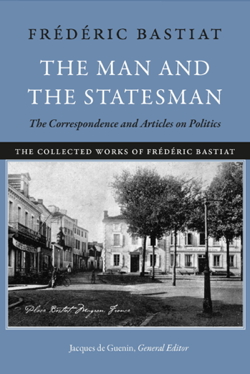
Bastiat’s Collected Works
vol. 1: The Man and
the Statesman: The Correspondence and Articles on Politics (2011)
A Cato Institute Book Forum
Friday October 14, 2011
[Created: October 6, 2011]
[Updated:
January 14, 2013]
 |
 |
Dr. David M. Hart, Liberty Fund, Inc.
Academic Editor of the Bastiat
Translation Project
Director of the Online Library of
Liberty Project
email: dhart@libertyfund.org
The Book under Discussion
The Collected Works of Frédéric Bastiat. Vol. 1: The Man and the Statesman: The Correspondence and Articles on Politics, translated from the French by Jane and Michel Willems, with an introduction by Jacques de Guenin and Jean-Claude Paul-Dejean. Annotations and Glossaries by Jacques de Guenin, Jean-Claude Paul-Dejean, and David M. Hart. Translation editor Dennis O’Keeffe (Indianapolis: Liberty Fund, 2011). Online at <http://oll.libertyfund.org/title/2393>.
Two Revolutionary Broadsides by Frédéric Bastiat (June 1848)
The following two short articles by Bastiat appeared in a small magazine which Bastiat, Molinari, and Coquelin started two weeks before the “June Days” riots of June 23-26, 1848 when French troops shot hundreds of protesters in the streets of Paris. The magazine, Jacques Bonhomme, was the second revolutionary magazine Bastiat and his friends had started, the first being La République française when appeared in February 1848, the day after the government resigned. In both magazines, Bastiat and his friends tried to persuade ordinary Parisians of the need for free markets, low taxes, and non-intervention in the economy. The articles are part of Liberty Fund’s edition of the Collected Works of Bastiat, vol. 1. A PDF version of this page is also available.
For more information about Bastiat’s life and work, as well as access to his works online, see the following:
- the essay by David Hart on vol. 1 of the Collected Works of Bastiat <http://davidmhart.com/liberty/Teaching/2011/CatoBookForum/CBF-6Oct2011.html> and his selection of quotations from that volume <http://davidmhart.com/liberty/FrenchClassicalLiberals/Bastiat/BastiatVol1-quotes.html>.
- the Bastiat page at the Online Library of Liberty <http://oll.libertyfund.org/person/25>
- the Bastiat page at my personal website <http://davidmhart.com/liberty/FrenchClassicalLiberals/Bastiat/index.html>
1. “Freedom” (Jacques Bonhomme, 11-15 June 1848)
[Source: Originally published in the first issue of Jacques Bonhomme, dated 11-15 June 1848 [CW1, pp. 433-44]. <http://oll.libertyfund.org/title/2393/226072>.]
I have lived a long time, seen a great deal, observed much, compared and examined many things, and I have reached the following conclusion:
Our fathers were right to wish to be free, and we should also wish this.
It is not that freedom has no disadvantages, since everything has these. To use these disadvantages in argument against it is to say to a man trapped in the mire: Do not get out, as you cannot do this without some effort.
Thus, it is to be wished that there be just one faith in the world, provided that it is the true one. However, where is the infallible authority which will impose it on us? While waiting for it to manifest itself, let us maintain the freedom of discussion and conscience.
It would be fortunate if the best method of teaching were to be universally adopted. But who has it and on what authority? Let us therefore demand freedom of teaching.
We may be distressed to see writers delight in stirring up all forms of evil passion. However, to hobble the press is also to hobble truth as well as lies. Let us, therefore, take care never to allow the freedom of the press to die.
It is distressing that man should be reduced to earning his bread by the sweat of his brow. It would be better for the state to feed everyone, but this is impossible. Let us at least have the freedom to work.
By associating with one another, men can gain greater advantage from their strength. However, the forms of association are infinite; which is best? Let us not run the risk that the state imposes the worst of these on us; let us seek the right one by trial and error, and demand the freedom of association.
A people has two ways of procuring something. The first is to make it; the second is to make something else and trade it. It is certainly better to have the option than not to have it. Let us therefore demand the freedom to trade.
I am throwing myself into public debate; I am trying to get through to the crowd to preach all the freedoms, the total of which make up liberty.
2. “Laissez-faire” (Jacques Bonhomme, 11-15 June, 1848)
[Source: Originally published in the first issue of Jacques Bonhomme, dated 11-15 June 1848 [CW1, pp. 434-45]. <http://oll.libertyfund.org/title/2393/226074>.]
Laissez-faire! I will begin by saying, in order to avoid any ambiguity, that laissez-faire is used here for honest things, with the state instituted precisely to prevent dishonest things.
This having been said, and with regard to things that are innocent in themselves, such as work, trade, teaching, association, banking, etc., a choice must be made. It is necessary for the state to let things be done or prevent them from being done.
If it lets things be done, we will be free and optimally administered most economically, since nothing costs less than laissez-faire.
If it prevents things from being done, woe to our freedom and our purse. Woe to our freedom, since to prevent things is to tie our hands; woe to our purse, since to prevent things requires agents and to employ agents takes money.
In reply to this, socialists say: “Laissez-faire! What a disaster!” Why, if you please? “Because, when you leave men to act, they do wrong and act against their interests. It is right for the state to direct them.”
This is simply absurd. Do you seriously have such faith in human wisdom that you want universal suffrage and government of all by all and then you proclaim these very men whom you consider fit to govern others unfit to govern themselves?